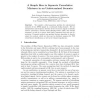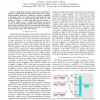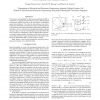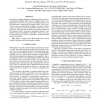24 search results - page 4 / 5 » A family of algorithms for blind equalization of QAM signals |
ESANN
2006
13 years 7 months ago
2006
We consider a blind separation problem for undetermined mixtures of two BPSK signals in a multi-path fading channel. We use independence and frequency diversity of the two source s...
GLOBECOM
2009
IEEE
14 years 27 days ago
2009
IEEE
— Semi-blind space-time equalisation is considered for dispersive multiple-input multiple-output systems that employ high-throughput quadrature amplitude modulation signalling. A...
ICASSP
2009
IEEE
14 years 27 days ago
2009
IEEE
The common zeros problem for blind system identification (BSI) is well known. It degrades the performance of classic BSI algorithms and therefore imposes the limit on the perform...
ICA
2010
Springer
13 years 6 months ago
2010
Springer
Abstract. In this paper, we propose a method for blind source separation (BSS) of convolutive audio recordings with short blocks of stationary sources, i.e. dynamically changing so...
ICASSP
2008
IEEE
14 years 18 days ago
2008
IEEE
One of the most popular algorithms for blind equalization is the Constant Modulus Algorithm (CMA), due to its simplicity and low computational cost. However, if the step-size is n...




